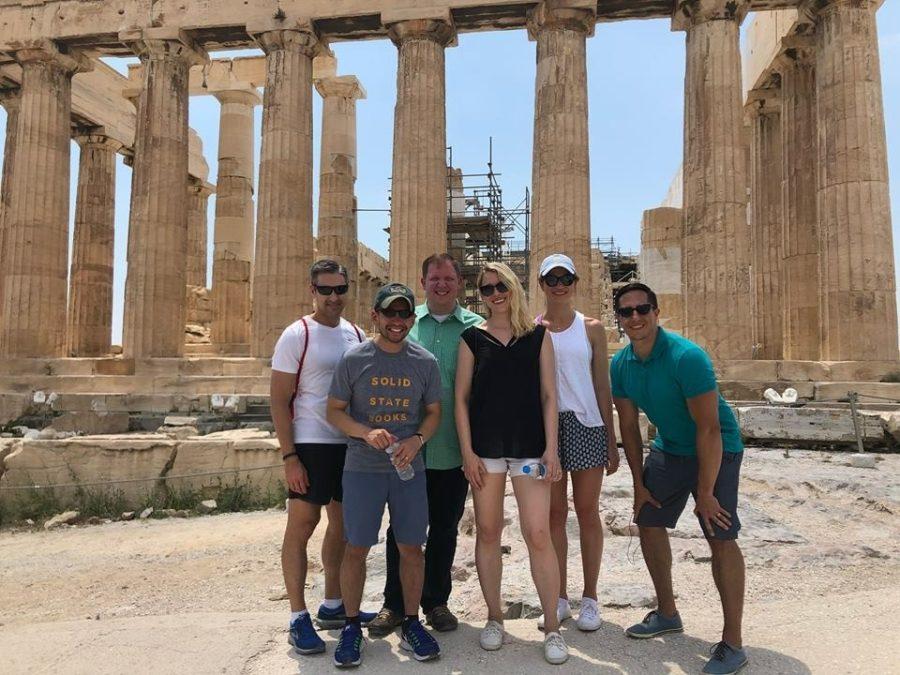Two University of Arizona alumni were among the 21 people selected from 655 applicants around the world to participate in the 2018 Atlantic Council Millennium Fellowship.
The Atlantic Council Millennium Fellowship is a two-year program with the goal of developing the next generation of leaders by providing its fellows with opportunities to meet world leaders and travel across the world for hands-on experience with global issues.
UA alumni Pete Seat and David Martinez were both selected for the Millennium Fellowship in 2018, adding to their already impressive careers.
Martinez graduated from the UA in 2004 with a bachelor’s degree in entrepreneurship and business management from the Eller College of Management. Martinez was a part of the UA Honors program and was named Honors Alumnus of the Year in 2017. He has worked as the negotiation courses chair for the Foreign Service Institute of the U.S. Department of State.
Seat graduated from the UA with a bachelor’s degree in theatre arts in 2005. Seat worked for the White House under the Bush Administration and now works for the Indiana Republican Party as the executive director of strategic communications and talent development.
RELATED: Two College of Nursing professors receive funding to take their work global
Seat and Martinez joined the fellowship on a trip to countries on the Aegean Sea to study the global refugee crisis. Both of them said the trip was one of the most impactful experiences they have had with the fellowship so far, especially when they visited a Syrian refugee camp.
“Being a U.S. diplomat, you spend so much time thinking about the high politics that you lose sight of how global politics are affecting people at their most human level,” Martinez said. “The most basic level meant this enormous tragedy of human migration and loss, and that was most nakedly expressed in the children there.”
Martinez said he decided to apply for the fellowship because he believed in its goals and wanted to connect with other fellows.
“I decided I really wanted to re-engage with intellectually stimulating communities of people who worked outside of my professional sphere, people with different perspectives and people from different sectors,” Martinez said. “And I really wanted something where I could learn about and support the Transatlantic Alliance.”
According to Martinez, the Transatlantic Alliance has helped maintain global peace since World War II, but Martinez said he fears the alliance is at risk of falling apart.
Seat said he applied for the fellowship on a whim after getting the idea from seeing his friends and colleagues engaging in foreign affairs.
“I came across the Atlantic Council’s Millennium Fellowship and realized it caps at 35 years of age, and I had just turned 35. I thought that if I had any chance to do this, now was the time,” Seat said.
Seat said he did not expect to be selected out of the 655 applicants and did not even tell his wife about it until he was selected.
RELATED: Two UA professors study shifting public opinion toward migrants
Martinez said the most important lessons he took away from the UA were from outside the classroom while working with the UA Honors College and working with homeless youth during spring break with Stand Up For Kids.
“Those experiences, along with the business background, gave me an approach to problem solving of thinking creatively and dedicating yourself to solving the problem,” Martinez said. “It took root in this idea that I needed to do something with a broader purpose which set me on a path to do everything I’ve done up to this point.”
Seat also said that his most important experiences at the UA were what he was able to do outside of the classroom, like being involved with Republican groups at the UA and around Arizona and the encouragement he got from his theater professors.
“Some of my professors in political science weren’t as encouraging, because we did not see eye to eye ideologically. They tended to be a little more liberal, and I was a little more conservative,” Seat said. “Whereas on the theatre side, despite the differences in how we saw issues, they could not have been more encouraging and welcoming.”
Seat and Martinez did not know each other until they met at an airport for the fellowship.
“When I got the list of biographies of the fellows, I was flipping through it and I happened to notice David [Martinez] graduated from the UA,” Seat said. “I thought that was kind of wild. Out of 21 people from around the world, you got two Wildcats.”
Follow Marquies White on Twitter









